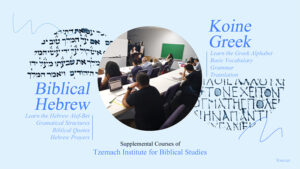 BEGINNER HEBREW 5:30-6:30 PM THURSDAY (BLDG #1)
BEGINNER HEBREW 5:30-6:30 PM THURSDAY (BLDG #1)
ADVANCED HEBREW 6:45-8:00 PM THURSDAY (BLDG #1)
GREEK COURSE – ON SELECT SUNDAYS (BLDG #1)
The Biblical Hebrew course will take the learner on a journey to build knowledge progressively, starting with the alef-bet [Read more…]
Knife Sharpening
 ONGOING
ONGOING
Have a knife that “…won’t cut hot buttah?” Worry no more! Get those dull blades sharpened by our blade grinder extraordinaire, Ryan Calhoun. Ryan will sharpen any flat-bladed knife or cleaver and even hatchets, axes and machetes. (No serrated edges or scissors, please). Remember: a sharp knife is easier and safer to use, [Read more…]
Scrubbies for Israel Project

Calling anyone interested to learn simple crochet stitches and raise funds for Israel at the same time. All proceeds will go towards The K’dumim Project in Israel. Don’t worry, you don’t have to know how to crochet, [Read more…]
Bible Study-27 (Leviticus 12-15)
 The question of “clean and unclean” is one of the most obscure Biblical concepts to Christians (a better choice of words would be “pure and defiled”). The commandments dealing with this subject appear to deal with a range of unrelated issues that the church chooses to ignore. Hopefully, we will be able to shed some light on importance of these concepts.
The question of “clean and unclean” is one of the most obscure Biblical concepts to Christians (a better choice of words would be “pure and defiled”). The commandments dealing with this subject appear to deal with a range of unrelated issues that the church chooses to ignore. Hopefully, we will be able to shed some light on importance of these concepts.
The main issue concerning “clean and unclean” is stated in Leviticus 15:31.
Thus you shall keep the sons of Israel separated from their uncleanness, lest they die in their uncleanness by their defiling My tabernacle that is among them (Leviticus 15:31).
So ritual cleanness or uncleanness has to do with the individual approaching God in His sanctuary. The individual had to be ritually “clean” (i.e., pure) to approach due to the implication for the sanctuary. In the next section we will see that part of the cleansing accomplished on Yom Kippur is that of the sanctuary itself due to the fact that it was exposed to the human community. The issue of “clean and unclean” primarily impacted the priesthood.
What are some of the things that would render a person “unclean”? One could become “unclean” by eating certain foods, by engaging in various activities or by coming in contact with a corpse. Most of the activities or conditions rendering a person “unclean” entail coming into contact with a dead person. Any discharge from the body except the elimination of bodily waste would render a person “unclean”. Finally, God distinguished between foods that were considered “clean” and those “unclean”. In our culture, the food prohibitions can be the most difficult to understand.
God is the living God. Jeremiah declared,
But the Lord is the true God; He is the living God and the everlasting King (Jeremiah 10:10a).
God will not allow anything associated with the concept of “death” to be associated with Him. In addition, any Israeli that was making a “karbon” (approach) was a type of God Himself. Ultimately, God would bring the ultimate karbon (His unique son, Jesus) to the altar. So, God demanded that any person making an offering to distinguish between “clean and unclean” and, therefore, be ritually “clean”. If a person became “unclean” for any reason, there was a ritual to render him, after a specified period of time, “clean” again.
In the gospels, Jesus began to distinguish between ritual defilement (“clean and unclean”) and spiritual defilement. From the perspective of the Kingdom of God, Jesus emphasized that spiritual defilement was more important than ritual defilement.
It is not what enters into the mouth that defiles the man, but what proceeds out of the mouth, this defiles the man (Matthew 15:11).
Jesus did not totally dismiss the issue of ritual defilement, but later, it appears that Paul did so, especially as it deals with food. Paul declared,
I know and am convinced in the Lord Jesus that nothing is unclean in itself, but to him who thinks anything to be unclean, to him it is unclean (Romans 14:14).
and,
men who forbid marriage and advocate abstaining from foods which God has created to be gratefully shared in by those who believe and know the truth. For everything created by God is good, and nothing is to be rejected if it is received with gratitude; for it is sanctified by means of the word of God and prayer (1 Timothy 4:3-5).
I don’t know if Paul meant to include ham sandwiches or not, but it appears as if he did. Still, Paul complied with the issue of ritual “cleanness” when offerings were made for him as he made an approach to the sanctuary in Jerusalem (Acts 21:17-26). He had been a believer for many years when this event occurred.
How do we answer the question of the difference between Leviticus and the New Testament? My only answer is that New Testament believers never become a type of God concerning the issue of karbon (offerings). That is a completed work; nothing can be added by us. Also, the issue of “clean and unclean” has to do with those “approaching” God. The believer in the Messianic Age lives in the Holy Place with Messiah Jesus and is not going out and coming in. Paul wrote,
…and raised us up with Him, and seated us with Him in the heavenly places in Christ Jesus (Ephesians 2:6).
and,
Therefore if you have been raised up with Christ, keep seeking the things above, where Christ is, seated at the right hand of God. Set your mind on the things above, not on the things that are on earth. For you have died and your life is hidden with Christ in God (Colossians 3:1-3).
Every believer must weigh these issues in his/her own faith walk. Everything should be established by faith by the individual. After all, Paul also wrote,
…whatever is not from faith is sin (Romans 14:23b).
Bible Study-06 (Genesis 25-28)

God Elects Israel
In this section of the Bible the subject shifts from the revealing of the “special son” to the establishment of the covenant line. There is a brief description of Isaac’s encounter with God and then a rapid refocus on Jacob. God would develop the account of the covenant line through Jacob.
We have seen that God began laying down the prophetic picture of the “special son” through Abraham, Sarah and Isaac. The account includes prophecies of the unique conception of the “special son”, of his being offered as a special sacrifice on Mt. Moriah, and, if we can receive it, his resurrection. In Isaac’s case, he was spared from death and raised up at the last moment and a ram was substituted for him on the altar. Finally, we see the prophecy of the calling of a “special bride” for the “special son” which we maintain is a picture of the Holy Spirit calling the church to be joined to the resurrected Jesus.
God appeared to Isaac and established His covenant with him. The covenant was the same as God had cut with Abraham. The provisions included the promise of blessing, of a unique ministry to all of mankind and of stewardship of the land of Israel. Much later (almost 600 years) God would reveal Himself to Moses at Mt. Sinai as the God of Abraham, the God of Isaac and the God of Jacob. The covenant was being established in the “mouth of three witnesses”.
Another interesting fact concerning Isaac was that he never experienced a name change. Abram’s name was changed to Abraham, Jacob’s name would be changed to Israel, but Isaac never had his name changed. This is most likely due to the prophetic significance of the relationship of Abraham to Isaac relative to the relationship of the Holy One and Messiah Jesus.
After 20 years of marriage, Isaac and Rebecca finally were blessed with children. Twins, Esau and Jacob, were born to them. Esau was born first so according to tradition, he would receive the special tribal blessing and authority. Esau and Jacob were diametrically opposite to one another. Esau was a hunter while Jacob was a shepherd. Jacob was chosen by God before their birth. Later Paul would quote Malachi saying,
“Jacob I loved, but Esau I hated” (Romans 9:13b).
So by God’s sovereign choice, Jacob was chosen to continue the line of promise which had previously been stated to Abraham and to Isaac. This was revealed to Rebekah before the twins were born. Jacob evidently dreamed of functioning in this capacity. Esau, on the other hand, did not embrace the vision of the Kingdom of God. He was only interested in temporal things. In a weak moment, Jacob purchased the birthright for a simple meal. Later, Jacob conspired with his mother to receive the blessing which Isaac would have given to Esau.
Jacob did not understand God’s election. He didn’t have to struggle for God’s calling. It had been given to him before his birth. However, he didn’t understand this principle. Much later David was anointed King of Israel while Saul still stood in that post. David “waited on the Lord” to establish his calling rather than attempting to establish it by his own devices. Jacob should have trusted God in this matter. Jacob was 97 years old before he simply trusted God to establish His purpose through him. His name was then changed to Israel.
We should ask ourselves the question, “How would this story be different if Jacob had simply trusted the Lord to establish his election from the beginning”? Even though Isaac was intent on giving the blessing to Esau, would God not have intervened to insure that Jacob received the anointing?
Are you struggling with God’s calling? We all must learn to “wait on the Lord”. At just the right time He will establish His purpose in you and in me.
- « Previous Page
- 1
- 2
- 3
- 4
- …
- 17
- Next Page »